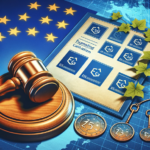The European Commission has unveiled a groundbreaking plan to dramatically reduce the European Union’s (EU) greenhouse gas emissions, targeting a 90% cut by 2040. This initiative is a cornerstone of the EU’s endeavor to become the first climate-neutral continent.
This proposal, announced ahead of the pivotal June elections, challenges the EU to achieve a near-complete reduction in emissions compared to 1990 levels, including carbon offsets. Despite a 30% reduction in emissions over the past three decades, the bloc faces an uphill task to double its efforts in half the time.
EU Climate Commissioner Wopke Hoekstra conveyed the bloc’s commitment to climate leadership. “Tackling the climate crisis is a marathon, not a sprint. We need to make sure everyone crosses the finish line, and nobody is left behind,” he affirmed.
The recommendation, poised for the next European Commission post-elections, also aims to mitigate the escalation of extreme weather events. However, the proposal has seen pushback, particularly from the agricultural sector, leading to the withdrawal of specific targets for farming pollution. This step has sparked criticism, as it is seen by some as a move against the interests of farmers themselves, who are vulnerable to climate change effects.
Pieter de Pous from the E3G thinktank commented on the paradoxical situation, noting the irony in farmers contesting policies meant for their protection against climate change.
The revised document omits previous mentions of reducing methane and nitrogen emissions from agriculture, focusing instead on initiating political dialogue without establishing new sector-specific targets.
Recent concessions to farmers, including retracting a pesticide reduction proposal and delaying wildlife and soil protection rules, have raised concerns about the steadfastness of the EU’s climate ambition.
The EU has made strides in transitioning to clean energy, with plans to reduce fossil fuel use in the energy sector by 80% by 2040 compared to 2021. Nonetheless, progress in sectors like food and transport remains limited.
The new strategy encompasses a vision for carbon capture, aiming to remove up to 400 megatonnes of CO2 from the atmosphere and industry by 2040.
EU Energy Commissioner Kadri Simon underscored the role of renewables and energy efficiency but also recognized the importance of carbon management technologies.
While carbon capture is touted as a solution for industries like cement, its future promise has been criticized for potentially slowing down immediate emission reduction efforts.
Greenpeace’s Silvia Pastorelli expressed skepticism, suggesting the EU’s plans fall short of addressing the climate crisis adequately, especially without clear commitments to ending fossil fuel dependence and addressing agricultural emissions.
















